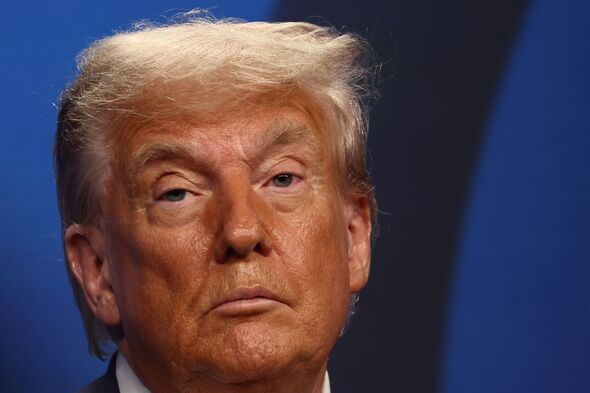President Donald Trump has stated that he is “very closely” monitoring a significant Russian military build-up near the Ukrainian city of Sumy. This development has sparked fears that Russian President Vladimir Putin may be planning to seize the city. The situation is further complicated by the United States’ recent decision to pause crucial arms supplies to Kyiv, including essential air defense missiles, due to concerns over dwindling American stockpiles.
When asked about his potential response if Putin were to authorize an offensive against Sumy, Trump responded, “We’ll see what happens. I’m watching it very closely.” The city of Sumy, home to 268,000 residents, is strategically located just 19 miles from the Russian border. Putin has previously expressed a desire to establish a “buffer zone” in the region, potentially viewing Sumy as a key acquisition to compensate for stalled progress elsewhere on the frontline.
Military Build-Up and Strategic Importance
Putin has amassed a force of 50,000 troops at the border after expelling most Ukrainian soldiers from Russia’s Kursk region, where they have maintained control for 11 months. This force represents one-third of the number initially deployed in a failed bid to capture Kyiv at the onset of Putin’s invasion in 2022. The city’s proximity to the border and its strategic significance make it a potential target for Russian expansion.
Meanwhile, Ukraine is facing a shortage of air defense missiles needed to counter Russia’s relentless missile and drone attacks. According to Politico, the U.S. Defense Department has halted the shipment of weapons to Ukraine, a move that Putin is likely to perceive as a victory. The suspended supplies include critical Patriot air defense missiles, precision artillery rounds, Hellfire missiles, drones, and missiles launched from F-16 fighters by Ukraine.
U.S. Defense Policy and International Reactions
The Pentagon’s decision was designed “to put America’s interests first following a [Department of Defense] review of our nation’s military support and assistance to other countries across the globe,” according to White House Deputy Press Secretary Anna Kelly. This stance comes despite Trump’s comments to Ukrainian President Volodymyr Zelensky at last week’s NATO summit, where he indicated he would “see” if the U.S. could provide Patriots to Kyiv.
“They (Ukraine) do want to have the anti-missiles as they call them, the Patriots, and we’re going to see if we can make some available,” Trump stated. “They are very hard to get. We need them too. We are supplying them to Israel, and they are very effective.”
Diplomatic Tensions and Humanitarian Impact
During their first phone conversation in three years, Putin made it clear to French President Emmanuel Macron that he has no plans to halt his military campaign. He shifted the blame for the conflict onto Western policies, suggesting that a resolution must address the “elimination of the root causes of the Ukrainian crisis” and acknowledge Russia’s claims to the Ukrainian territory it currently occupies.
This statement was made amidst new terror attacks by Putin’s forces on Ukrainian civilians overnight. In Kherson, a hospital was targeted, resulting in injuries to five patients and three nurses. “They have explosive injuries, contusions, and various wounds,” reported Oleksandr Prokudin, head of the regional military administration. Additionally, officials reported that four individuals were wounded in Ukraine’s Kharkiv region due to new drone strikes.
Future Implications and Strategic Shifts
In the meantime, Russia has mandated a decrease in the number of medical exemptions for army service, potentially enabling Putin to mobilize more troops. A decade ago, approximately 30 percent were exempted. This figure is set to drop to 17.5 percent by 2030, and further down to 16 percent by 2036.
The announcement comes as international observers continue to assess the potential for escalation in the region. The strategic maneuvers by both the United States and Russia highlight the complex interplay of military readiness, diplomatic negotiations, and geopolitical strategy. As the situation unfolds, the world watches closely, aware that the decisions made in the coming weeks could have far-reaching consequences for regional stability and international relations.
